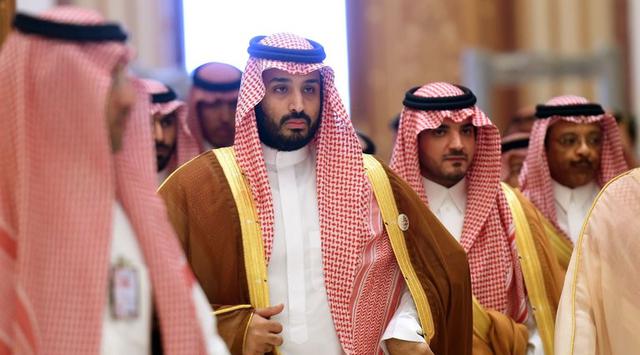
[ad_1]
The murder of journalist Jamal Khashoggi has tarnished the global image of Saudi Crown Prince Mohammed bin Salman

REFORMER OR AUTHORITARIAN. File photo of Saudi Crown Prince Mohammed bin Salman, who is known by his initials MBS. AFP photo
DUBAI, United Arab Emirates – Saudi Crown Prince Mohammed bin Salman, whose image has been tarnished by the murder of Jamal Khashoggi, gained popularity after shaking up the ultraconservative kingdom with reforms. But many now see his crackdown on dissent as verging on authoritarianism.
Known by his initials MBS, the young, charismatic heir apparent to the Gulf region’s most powerful throne has overseen the most fundamental transformation in the modern history of the oil-rich nation and sidelined all rivals after emerging as first-in-line in June 2017.
US President Donald Trump quickly saw the prince as a vital pillar of the American strategy of containing Iran – long a Saudi foe while trying to bring Israel and Saudi Arabia closer together in the search for a Middle East peace plan.
Still only 33, Prince Mohammed has pledged to usher in a “moderate” Saudi Arabia as he seeks to win over international investors for his grandiose vision to overhaul the kingdom’s oil-reliant economy.
He has also taken on the powerful clerics who long dominated Saudi life and struck out at the nation’s coddled elite with a dramatic purge in September last year of royals, ministers and business figures that saw hundreds detained in a probe over graft worth $100 billion.
But Riyadh’s admission on October 20 – after two weeks of mounting global outrage – that prominent critic Khashoggi was murdered during “a brawl” inside the Saudi consulate in Istanbul on October 2 has jeopardized the prince’s carefully cultivated reformist image.
Selfies with supporters
Two of the prince’s inner circle, deputy intelligence chief Ahmad al-Assiri and royal court media advisor Saud al-Qahtani, have been sacked for their roles in Khashoggi’s killing.
Yet Saudi officials have sought to shield the young prince from the gruesome affair, insisting he had “not been informed” of what was afoot.
And he still appears to have the unwavering support of his 82-year-old father, King Salman, who on Saturday named him as the head of a new committee charged with revamping the intelligence services.
To show he remains firmly in place, MBS made a high-profile, if brief, appearance on Tuesday at a glitzy investment forum, aimed at diversifying the country’s economy.
Winning a standing ovation from the gathered delegates, he later posed for selfies with participants, smiling broadly and appearing to brush aside a wave of boycotts by global business leaders and top officials.
The prince was also due on Wednesday to speak at the forum, being held in the same luxury hotel where he detained scores of people last year, in what will be his first public comments since Khashoggi’s murder.
Born on August 31, 1985, the favorite son of King Salman has said he was raised strictly by his mother. He has a law degree from King Saud University, and is now the father of two sons and two daughters.
Since becoming the heir apparent, Prince Mohammed has developed close ties with the White House under Trump, especially with his son-in-law and adviser Jared Kushner.
Presenting himself as reformer to Western governments keen to carry on doing business and earning Saudi petrodollars, he has taken a series of measures including lifting the decades-long ban on women driving, reducing the powers of the religious police and agreeing to the reopening of cinemas.
It is all part of Prince Mohammed’s Vision 2030 plan for economic and social reforms as Riyadh prepares for a post-oil era, which include a series of ambitious projects such as futuristic mega-cities.
One of the centerpieces of the plan was to sell off 5.0 percent of shares in the oil giant Aramco, in an IPO which could raise some $100 billion for the Gulf kingdom. But the plans have been repeatedly delayed.
‘Old-style tribal leader’
And since he took over as crown prince, he has unleashed a harsh crackdown on political dissent, earning sharp criticism from non-governmental organizations.
In September 2017, Human Rights Watch and Amnesty International reported the arrest of dozens of writers, journalists, activists and religious leaders, including prominent Islamist cleric Sheikh Salman al-Awda.
It was around this time that Khashoggi left the kingdom for self-imposed exile in the US.
The crown prince was also heavily criticized for placing Lebanese Prime Minister Saad Hariri under house arrest in Riyadh in November.
“Deep inside him, he is an old-fashioned tribal leader,” Khashoggi told Newsweek earlier this year in an off-the-record conversation, only released after the reports of his killing had been confirmed.
‘Impulsive intellectual’
The prince has pushed to curb the power of hardline clerics and prominent sheikhs who promote the kingdom’s uncompromising version of Islam, recognizing that his country’s association with Wahhabism is a problem.
And he has also beefed up the kingdom’s foreign policy, raising alarm with a ruinous conflict in neighboring Yemen backing the government against Iran-backed Huthi rebels as well as a dragging blockade against Qatar.
One western diplomat, who asked not to be named, described the prince last year as “an intellectual machine” but with a tendency to be “impulsive”.
Prince Mohammed “is very much a believer in himself. He doesn’t believe in anybody else”, Khashoggi told Newsweek.
“He doesn’t check. He doesn’t have proper advisers, and he is moving toward a Saudi Arabia according to him, a Saudi Arabia according to Mohammed bin Salman only.” – Rappler.com
Source link